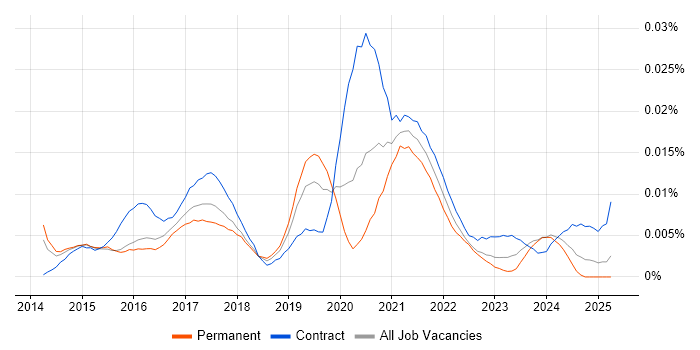Internet of Things Architect (IoT Architect)
UK
The median Internet of Things Architect (IoT Architect) salary in the UK is £55,000 per year, according to job vacancies posted during the 6 months leading to 3 October 2025.
The table below compares current salary benchmarking and summary statistics with the previous two years.
| 6 months to 3 Oct 2025 |
Same period 2024 | Same period 2023 | |
|---|---|---|---|
| Rank | 663 | - | - |
| Rank change year-on-year | - | - | - |
| Permanent jobs requiring an IoT Architect | 3 | 0 | 0 |
| As % of all permanent jobs in the UK | 0.006% | - | - |
| As % of the Job Titles category | 0.007% | - | - |
| Number of salaries quoted | 1 | 0 | 0 |
| 10th Percentile | - | - | - |
| 25th Percentile | £52,500 | - | - |
| Median annual salary (50th Percentile) | £55,000 | - | - |
| 75th Percentile | £57,500 | - | - |
| 90th Percentile | - | - | - |
| UK excluding London median annual salary | £55,000 | - | - |
All Permanent IT Job Vacancies
UK
For comparison with the information above, the following table provides summary statistics for all permanent IT job vacancies. Most job vacancies include a discernible job title that can be normalized. As such, the figures in the second row provide an indication of the number of permanent jobs in our overall sample.
| Permanent vacancies in the UK with a recognized job title | 44,490 | 71,005 | 55,480 |
| % of permanent jobs with a recognized job title | 89.76% | 95.30% | 95.51% |
| Number of salaries quoted | 25,627 | 41,157 | 42,977 |
| 10th Percentile | £28,250 | £31,000 | £32,444 |
| 25th Percentile | £36,250 | £40,547 | £43,750 |
| Median annual salary (50th Percentile) | £55,000 | £55,000 | £60,000 |
| Median % change year-on-year | - | -8.33% | - |
| 75th Percentile | £73,750 | £75,000 | £80,000 |
| 90th Percentile | £95,000 | £93,750 | £97,500 |
| UK excluding London median annual salary | £47,500 | £50,000 | £52,500 |
| % change year-on-year | -5.00% | -4.76% | - |
IoT Architect
Job Vacancy Trend
Historical trend showing the proportion of permanent IT job postings featuring 'IoT Architect' in the job title relative to all permanent IT jobs advertised.

IoT Architect
Salary Trend
Salary distribution trend for IoT Architect job vacancies in the UK.

IoT Architect
Top 7 Job Locations
The table below looks at the demand and provides a guide to the median salaries quoted in IT jobs citing IoT Architect within the UK over the 6 months to 3 October 2025. The 'Rank Change' column provides an indication of the change in demand within each location based on the same 6 month period last year.
| Location | Rank Change on Same Period Last Year |
Matching Permanent IT Job Ads |
Median Salary Past 6 Months |
Median Salary % Change on Same Period Last Year |
Live Jobs |
|---|---|---|---|---|---|
| England | - | 3 | £55,000 | - | 1 |
| Work from Home | - | 3 | £55,000 | - | 2 |
| UK excluding London | - | 2 | £55,000 | - | 1 |
| North of England | - | 1 | - | - | |
| London | - | 1 | - | - | |
| North West | - | 1 | - | - | |
| South West | - | 1 | £55,000 | - | 1 |
IoT Architect Skill Set
Top 30 Co-Occurring Skills & Capabilities
For the 6 months to 3 October 2025, IoT Architect job roles required the following skills and capabilities in order of popularity. The figures indicate the absolute number of co-occurrences and as a proportion of all permanent job ads featuring IoT Architect in the job title.
|
|
IoT Architect Skill Set
Co-Occurring Skills & Capabilities by Category
The following tables expand on the one above by listing co-occurrences grouped by category. They cover the same employment type, locality and period, with up to 20 co-occurrences shown in each category:
